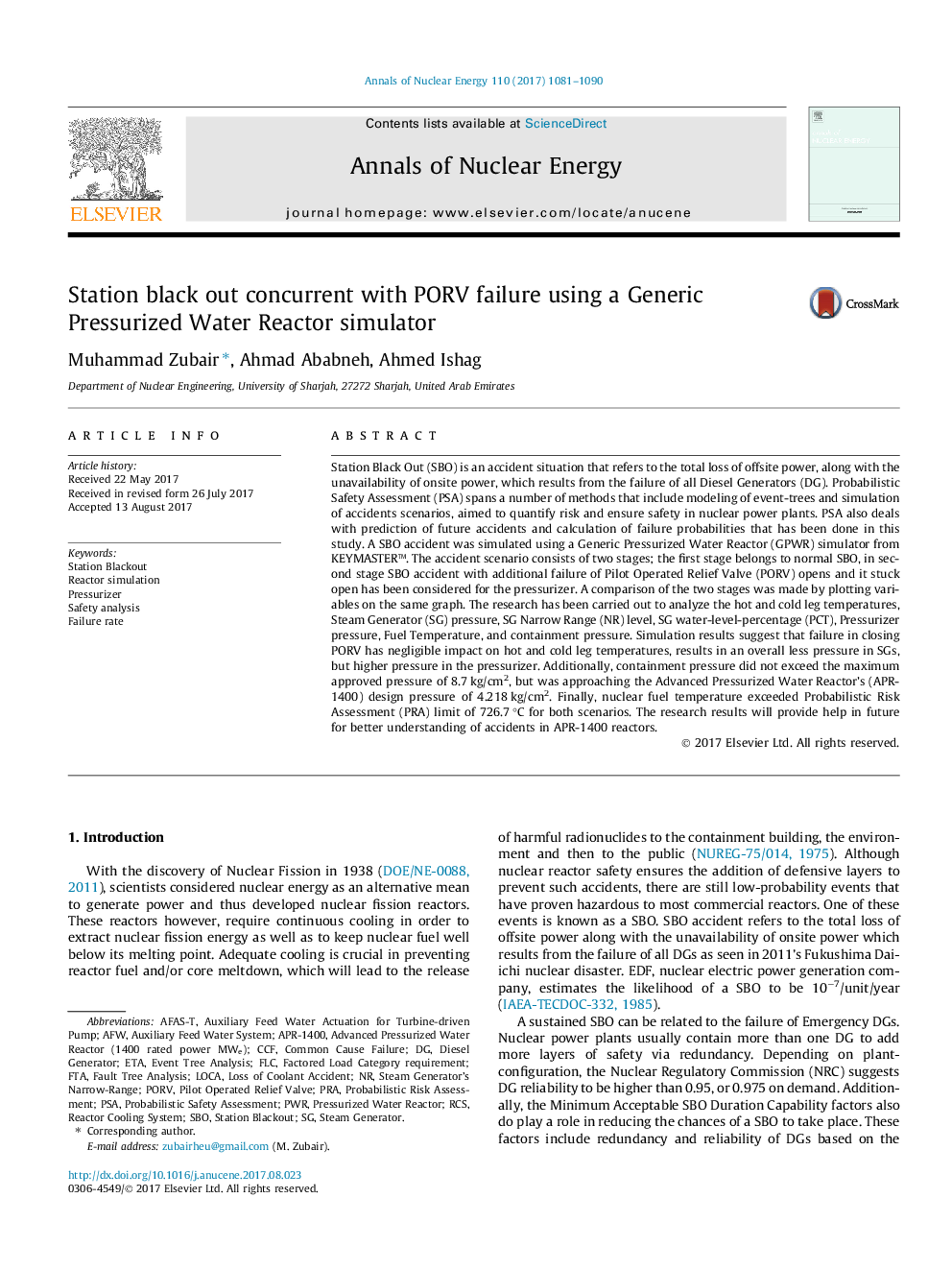| کد مقاله | کد نشریه | سال انتشار | مقاله انگلیسی | نسخه تمام متن |
|---|---|---|---|---|
| 5475006 | 1521086 | 2017 | 10 صفحه PDF | دانلود رایگان |
عنوان انگلیسی مقاله ISI
Station black out concurrent with PORV failure using a Generic Pressurized Water Reactor simulator
دانلود مقاله + سفارش ترجمه
دانلود مقاله ISI انگلیسی
رایگان برای ایرانیان
کلمات کلیدی
ETAAFWPoRVPWRPSAFLCFTARCSPRALocaCCFProbabilistic Safety Assessment - ارزیابی ایمنی احتمالیProbabilistic risk assessment - ارزیابی ریسک احتمالیLoss of coolant accident - از دست دادن تصادف خنک کنندهevent tree analysis - تجزیه و تحلیل درخت رویدادFault tree analysis - تجزیه و تحلیل درخت شکستPressurized Water Reactor - راکتور آب تحت فشارCommon cause failure - شکست عام مشترکDiesel generator - ژنراتور دیزلی
موضوعات مرتبط
مهندسی و علوم پایه
مهندسی انرژی
مهندسی انرژی و فناوری های برق
پیش نمایش صفحه اول مقاله

چکیده انگلیسی
Station Black Out (SBO) is an accident situation that refers to the total loss of offsite power, along with the unavailability of onsite power, which results from the failure of all Diesel Generators (DG). Probabilistic Safety Assessment (PSA) spans a number of methods that include modeling of event-trees and simulation of accidents scenarios, aimed to quantify risk and ensure safety in nuclear power plants. PSA also deals with prediction of future accidents and calculation of failure probabilities that has been done in this study. A SBO accident was simulated using a Generic Pressurized Water Reactor (GPWR) simulator from KEYMASTERâ¢. The accident scenario consists of two stages; the first stage belongs to normal SBO, in second stage SBO accident with additional failure of Pilot Operated Relief Valve (PORV) opens and it stuck open has been considered for the pressurizer. A comparison of the two stages was made by plotting variables on the same graph. The research has been carried out to analyze the hot and cold leg temperatures, Steam Generator (SG) pressure, SG Narrow Range (NR) level, SG water-level-percentage (PCT), Pressurizer pressure, Fuel Temperature, and containment pressure. Simulation results suggest that failure in closing PORV has negligible impact on hot and cold leg temperatures, results in an overall less pressure in SGs, but higher pressure in the pressurizer. Additionally, containment pressure did not exceed the maximum approved pressure of 8.7 kg/cm2, but was approaching the Advanced Pressurized Water Reactor's (APR-1400) design pressure of 4.218 kg/cm2. Finally, nuclear fuel temperature exceeded Probabilistic Risk Assessment (PRA) limit of 726.7 °C for both scenarios. The research results will provide help in future for better understanding of accidents in APR-1400 reactors.
ناشر
Database: Elsevier - ScienceDirect (ساینس دایرکت)
Journal: Annals of Nuclear Energy - Volume 110, December 2017, Pages 1081-1090
Journal: Annals of Nuclear Energy - Volume 110, December 2017, Pages 1081-1090
نویسندگان
Muhammad Zubair, Ahmad Ababneh, Ahmed Ishag,